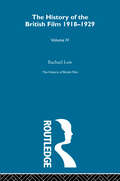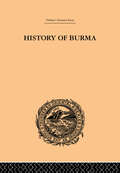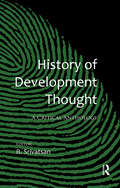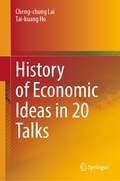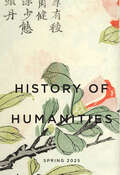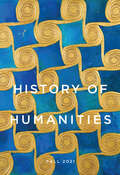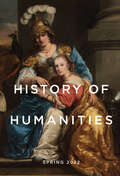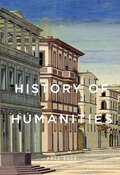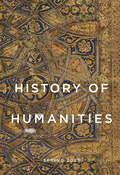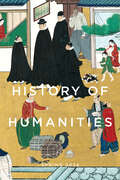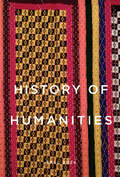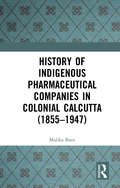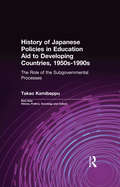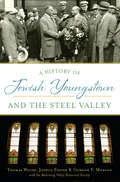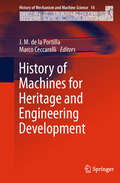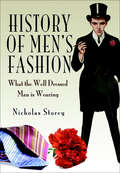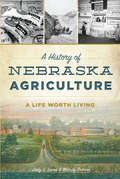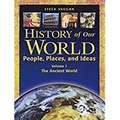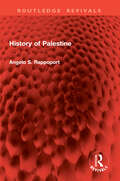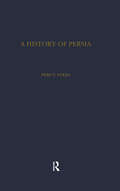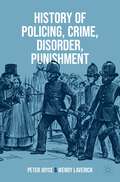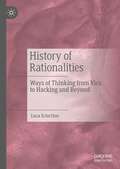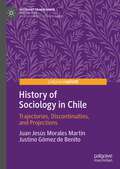- Table View
- List View
History of British Film (Volume 4): The History of the British Film 1918 - 1929
by Rachael LowThis set is one of the cornerstones of film scholarship, and one of the most important works on twentieth century British culture. Published between 1948 and 1985, the volumes document all aspects of film making in Britain from its origins in 1896 to 1939.Rachael Low pioneered the interpretation of films in their context, arguing that to understand films it was necessary to establish their context. Her seven volumes are an object lesson in meticulous research, lucid analysis and accessible style, and have become the benchmark in film history.
History of Burma: From the Earliest Time to the End of the First War with British India
by Arthur P. PhayreThis classic history, first published in 1883, is the first English-language work to provide a comprehensive history of Burma, now Myanmar, based on Burmese sources. It incorporates the early history not only of Burma proper, but also those of the surrounding kingdoms of Pegu, Taungu, Tenasserim, and Arakan, comparing when possible differing accounts of events as described in those chronicles. Includes original extensive appendixes and large foldout map.
History of Development Thought: A Critical Anthology
by R. SrivatsanDevelopment thought emerged as the governing principle of First World global hegemony in the new world order marked by the end of the Second World War and decolonization. Six decades later, at yet another critical geopolitical conjuncture marked by globalization and neoliberal resurgence, History of Development Thought revisits the major strands in the development debate from the 1950s to the early twenty-first century. The volume places classic international interventions in critical development thinking alongside major contributions to the discourse from the Indian context.Beginning by juxtaposing W. A. Lewis’s classic liberal theory of the dual economy with P. C. Mahalanobis’s schema for planned development in India, the volume tracks the trajectory of the development debate — from the Latin American neo-Marxist paradigm, through the ‘mode of production’ debates in India, to Indian and international feminist perspectives on development. It explores the departures of the 1980s in India and elsewhere as theorists, including Pranab Bardhan, Sukhamoy Chakravarty, Partha Chatterjee, A. O. Hirschman, Samuel Huntington, and Amartya Sen, sought to address from various perspectives the reasons for the failure of development to live up to expectations. It ends with excerpts signposting the emerging strands of the development (and post-development) debate at the turn of the twenty-first century. Throughout, the volume remains committed to the paradigm of development as a horizon of critical thought and a field of democratic politics, while paying attention to the multiple storylines of the discourse over the last 60 years. This anthology, together with its critical introduction and rigorous prefatory remarks for each extract, will be invaluable to students and researchers in the social sciences and the humanities, especially those in development studies, history, politics and economics, as well as to activists, administrators, and professionals in health, education, and development.
History of Economic Ideas in 20 Talks
by Cheng-chung Lai Tai-kuang HoThis book provides a concise history of economic thought for readers of all ages. While some basic economics knowledge would be helpful, it is not required. The book sets out to achieve three aims: to be interesting, entertaining, and thought-provoking. While the authors may appear opinionated in certain instances, this is intentionally done in order to alert readers to form their own views. History of ideas does not make the us smarter nor richer, but it can reduce our ignorance and the “banality of evil”—a term Hannah Arendt referred to people who lack self-reflection, “He did his duty...; he not only obeyed orders, he also obeyed the law.”
History of Humanities, volume 10 number 1 (Spring 2025)
by History of HumanitiesThis is volume 10 issue 1 of History of Humanities. History of Humanities, along with the Society for the History of the Humanities, takes as its subject the history of a wide variety of disciplines including archaeology, art history, historiography, linguistics, literary studies, musicology, philology, and media studies, tracing these fields from their earliest developments, through their formalization into university disciplines, and to the modern day. By exploring the history of humanities across time and civilizations and along with their sociopolitical and epistemic implications, the journal takes a critical look at the concept of humanities itself.
History of Humanities, volume 6 number 2 (Fall 2021)
by History of HumanitiesThis is volume 6 issue 2 of History of Humanities. History of Humanities, along with the Society for the History of the Humanities, takes as its subject the history of a wide variety of disciplines including archaeology, art history, historiography, linguistics, literary studies, musicology, philology, and media studies, tracing these fields from their earliest developments, through their formalization into university disciplines, and to the modern day. By exploring the history of humanities across time and civilizations and along with their sociopolitical and epistemic implications, the journal takes a critical look at the concept of humanities itself.
History of Humanities, volume 7 number 1 (Spring 2022)
by History of HumanitiesThis is volume 7 issue 1 of History of Humanities. History of Humanities, along with the Society for the History of the Humanities, takes as its subject the history of a wide variety of disciplines including archaeology, art history, historiography, linguistics, literary studies, musicology, philology, and media studies, tracing these fields from their earliest developments, through their formalization into university disciplines, and to the modern day. By exploring the history of humanities across time and civilizations and along with their sociopolitical and epistemic implications, the journal takes a critical look at the concept of humanities itself.
History of Humanities, volume 7 number 2 (Fall 2022)
by History of HumanitiesThis is volume 7 issue 2 of History of Humanities. History of Humanities, along with the Society for the History of the Humanities, takes as its subject the history of a wide variety of disciplines including archaeology, art history, historiography, linguistics, literary studies, musicology, philology, and media studies, tracing these fields from their earliest developments, through their formalization into university disciplines, and to the modern day. By exploring the history of humanities across time and civilizations and along with their sociopolitical and epistemic implications, the journal takes a critical look at the concept of humanities itself.
History of Humanities, volume 8 number 1 (Spring 2023)
by History of HumanitiesThis is volume 8 issue 1 of History of Humanities. History of Humanities, along with the Society for the History of the Humanities, takes as its subject the history of a wide variety of disciplines including archaeology, art history, historiography, linguistics, literary studies, musicology, philology, and media studies, tracing these fields from their earliest developments, through their formalization into university disciplines, and to the modern day. By exploring the history of humanities across time and civilizations and along with their sociopolitical and epistemic implications, the journal takes a critical look at the concept of humanities itself.
History of Humanities, volume 9 number 1 (Spring 2024)
by History of HumanitiesThis is volume 9 issue 1 of History of Humanities. History of Humanities, along with the Society for the History of the Humanities, takes as its subject the history of a wide variety of disciplines including archaeology, art history, historiography, linguistics, literary studies, musicology, philology, and media studies, tracing these fields from their earliest developments, through their formalization into university disciplines, and to the modern day. By exploring the history of humanities across time and civilizations and along with their sociopolitical and epistemic implications, the journal takes a critical look at the concept of humanities itself.
History of Humanities, volume 9 number 2 (Fall 2024)
by History of HumanitiesThis is volume 9 issue 2 of History of Humanities. History of Humanities, along with the Society for the History of the Humanities, takes as its subject the history of a wide variety of disciplines including archaeology, art history, historiography, linguistics, literary studies, musicology, philology, and media studies, tracing these fields from their earliest developments, through their formalization into university disciplines, and to the modern day. By exploring the history of humanities across time and civilizations and along with their sociopolitical and epistemic implications, the journal takes a critical look at the concept of humanities itself.
History of Indigenous Pharmaceutical Companies in Colonial Calcutta (1855–1947)
by Malika BasuIn the context of life and civilization, the pharmaceutical industry is as old as human existence. Since time immemorial India had its own enriched indigenous tradition of medicine. The development of alchemy and its application for human welfare was also an important step in Indian scientific tradition. The present monograph is an innovative attempt to understand the history of the indigenous pharmaceutical companies in Calcutta during the colonial times. Here pharmaceutical companies have been viewed as an illuminating lens to understand the interconnectedness between Indian traditions of thought and Western science and subsequent development of pharmaceutical industry in colonial India. The entire gamut of discussion centres around the issues of medical education, medical services, public health, pharmaceutical profession and politico-economic contexts of the development of pharmaceutical industry in colonial India. Three indigenous pharmaceuticals namely – Butto Krishna Paul & Co., Bengal Chemical & Pharmaceutical Works Limited, and East India Pharmaceutical Works Limited have been studied. The study not only portrays the politico-economic background to the emergence of the pharmaceutical industry in colonial India but links it to the economic nationalism and the quest for self-sufficiency among Indian nationalists and entrepreneurs. The pharmaceutical industry in India can be symbolic of a cultural response to modern science which was to pave the subsequent trajectory of national scientific endeavours in India.Please note: Taylor & Francis does not sell or distribute the Hardback in India, Pakistan, Nepal, Bhutan, Bangladesh and Sri Lanka.
History of Japanese Policies in Education Aid to Developing Countries, 1950s-1990s: The Role of the Subgovernmental Processes (East Asia: History, Politics, Sociology and Culture)
by Takao KamibeppuFirst published in 2002. Routledge is an imprint of Taylor & Francis, an informa company.
History of Jewish Youngstown and the Steel Valley, A (American Heritage)
by Thomas Welsh Gordon F. Morgan Joshua Foster The Mahoning Valley Historical SocietyFounded in the Mahoning Valley during 1837, a tiny settlement of secular German immigrants grew into one of the most influential centers of Jewish life in the Midwest. Home to nationally renowned rabbis and Zionist firebrands alike, the community produced an astonishing array of leaders in an impressive range of fields throughout the twentieth century. This notable legacy ranges from the entertainment juggernaut of Warner Brothers to the Arby’s fast-food empire and the prominent Youngstown Sheet & Tube, among many others. Authors Thomas Welsh, Joshua Foster and Gordon F. Morgan trace the unique history of one of Ohio’s oldest Jewish communities from its humble beginnings into the challenging climate of the new millennium.
History of Machines for Heritage and Engineering Development
by J. M. Portilla Marco CeccarelliThis volume contains a selection of papers whose content have been presented at the International conferences CIPHI on Cultural Heritage and History of Engineering at University of Las Palmas de Gran Canaria in the Canary Islands, Spain, in recent years. The conference series is aimed at bringing together researchers, scholars and students from a broad range of disciplines referring to the History of Engineering and Cultural Heritage, in a unique multidisciplinary forum to stimulate collaboration among historians, architects, restaurateurs, and engineers. These papers illustrate, by treating specific emblematic topics and problems, technical developments in the historical evolution of engineering concerning cultural heritage. Thus, emphasis is given to a discussion of matters of cultural heritage with engineering history by reporting authors' experiences and views. Topics treated include: reutilization of industrial heritage: the unique example of the Royal Segovia Mint in Spain; the image of factories; Pedro Juan De Lastanosa and "the twenty-one books of devices and machines of Juanelo"; the historical development of paper-mills and their machines in South Latium during 19th century; a virtual reconstruction of a wave-powered flour mill from 1801; 3D modelling and animation study of the industrial heritage wonders; a new model of the hydraulic machine known as "el artificio de Juanelo"; and the mystery of one Havana portrait, on the first steam machine in Cuba. This work has been made possible thanks to the invited authors who have enthusiastically shared this initiative and who have spent time and effort in preparing the papers in much more detail that in the conference presentations.
History of Management Thought: Genesis and Development from Ancient Origins to the Present Day (Contributions to Management Science)
by Vadim I. MarshevThis book describes the millennia-long process of the genesis, formation, struggle, and change of views on the management of social organizations in various countries around the world; in other words, it characterizes the worldwide evolution of the History of Management Thought (HMT) - ideas, concepts, theories, paradigms, and scientific schools - from Antiquity to the present. The book is the outcome of extensive research, based on the analysis, generalization, and systematization of foreign and domestic published literature, as well as on the gathering and analysis of unique archival materials. For the first time in the historical and managerial literature, the book puts forward original definitions of three historical and managerial sciences - the History of Management, the History of Management Thought, and the Historiography of Historical and Managerial Research. It addresses the main challenges in pursuing Historical and Scientific Research (HSR), the main “subject” levels of HSR and specific methodological problems concerning HMT, as well as epistemological methods for identifying key factors in and causes of the advent and evolution of HMT. This book presents both the origins of management thought dating back to the 5th millennium BC and the latest management concepts of the early 21st century. In particular, it traces the origins and sources of management thought, reflected in the works of thinkers and statesmen of the Ancient World (Egypt, Western Asia, China, India, Greece, and Rome), the era of feudalism, and the Middle Ages (Byzantium, Western Europe, and England), the era of inception capitalism (Western Europe and the USA), as well as the new and recent history of management thought of the 20th and 21st centuries. In addition, for the first time in History of Management literature, it presents the history of Russian management thought from the 9th century to modern concepts and scientific schools.
History of Men's Fashion: What the Well Dressed Man is Wearing
by Nicholas Storey&“Anyone aiming for timeless elegance, rather than temporary chic, will benefit from Storey&’s authoritative, but readable book.&” —Esquire Everything you ever wanted to know about men&’s clothing—and so much more—from the exact hour Nelson lost his right eye to the type of palm needed for a Panama hat, what Cary Grant&’s tailor had to do to his shoulders—and those all-important questions of what to where, when and why, including when to wear a bow tie (surely never is the only answer?). A quirky book full of facts that you never realised you needed to know, including the exact thickness of animal hair used to create must-have fashion items, including suits. Provocative, and controversial at times but always very well dressed. &“Mr. Storey, a barrister, offers a compendium of correct garments for all occasions, plus the best places to bespeak them, as well as anecdotes from films, books, royalty, and the beau monde . . . He solves every quandary, from proper &‘full-fig&’ (white tie) to the right (grey) topper for Ascot, to where to get and wear tweed. It is all here. Hats off.&” —Country Life &“Leaders of fashion all share one thing in common: a discerning penchant for the English sartorial standard. This book covers all the main areas rather well, just how Beau Brummell would have specified.&” —Maxim &“Pokes gentle fun at men&’s fashions through the last two centuries . . . This is popular history at its very best, amusing, entertaining, enlightening, and very, very funny . . . It&’s a brilliant book!&” —Books Monthly
History of Nebraska Agriculture, A: A Life Worth Living (American Heritage)
by Jody L. DobsonOnce known as the “Great American Desert,” Nebraska’s plains and native grasslands today make it a domestic leader in producing food, feed and fuel. From Omaha to Ogallala, Nebraska’s founding farmers, ranchers and agribusiness leaders endured hardships while fostering kinships that have lasted generations. While many continued on the trails leading west, others from around the world stayed, seeking a home and land to cultivate. American Doorstop Project co-founders and authors Jody L. Lamp and Melody Dobson celebrate the state’s forgotten and untold agricultural history, highlighting more than a century and a half of agriculture industry, inventions and innovations in the Cornhusker State.
History of Our World: People, Places, and Ideas (Volume 1 of the Ancient World)
by Henry BillingsLife for the earliest people was very different from life today. What if the things you use every day suddenly disappeared? Imagine your life without houses, cars, clothes, or books. How would you find food? How would you stay safe? These are questions that the earliest people faced. This unit tells how the earliest people answered those questions. To us, it might not seem like a big step to put a seed in the ground or a wheel on a cart. But for early people, each discovery was a huge step forward.
History of Palestine (Routledge Revivals)
by Angelo S. RappoportFirst published in 1931, History of Palestine is the dramatic picture of the Holy Land to which Jews returned after many centuries. The author has written the history of Palestine of 4000 years with the mind of the scholar and the heart of the religious mystic. Divided into three parts—pre-Israelite Palestine; Palestine, the promised land of the Hebrews; and Palestine, the holy land of Christendom, this book will appeal to students and researchers of history and general readers interested in the topic.
History of Persia (Routledge Library Editions)
by Sir Percy SykesThis is a facsimile of a classic history first published by Macmillan in 1915 and issued in two further editions by Routledge and Kegan Paul. Sir Percy Sykes was an explorer, consul, soldier and a spy who lived and travelled in Persia over a period of twenty-five years. This two-volume collection provides a comprehensive history of Persia from Alexander the Great, through British, French and Russian colonialism, to the early twentieth century oil industry.With a new introduction by Sykes' biographer, Antony Wynn, this comprehensive history provides essential background reading to students and academics of Persia.
History of Policing, Crime, Disorder, Punishment
by Peter Joyce Wendy LaverickThis engaging textbook provides a broad and unique coverage of the key historical events that shaped ideas in criminology, criminal justice and policing from the late seventeenth century to the early twenty-first century in England and Wales. It vividly illustrates the multi-disciplinary nature of criminology and penology by providing important insights into the social and political issues that shaped the development and operations of the criminal justice system and its responses to both crime and disorder. Using key text boxes, this book highlights key people, theorists, foundational principles and events throughout. Part One discusses the nature of crime and forms of punishment between 1689 and 1750 and the penological concerns regarding the aims of punishment. Part Two focuses on crime and disorder between 1750 and 1850, examining the impact of urbanization on criminal activity and it considers the background and state responses to key episodes of public disorder. Part Three covers the development of policing 1689-1856 and the contribution to policing made by reformers and the implementation of police reform. Part Four deals with a number of issues affecting crime and punishment between 1850 and 1920 including episodes such as Irish Home Rule within the context of ‘high policing’. It evaluates changes to the nature and role of prisons that occurred in this period. This student-friendly book contains end of chapter questions which summarise and enable further discussion.
History of Rationalities: Ways of Thinking from Vico to Hacking and Beyond
by Luca SciortinoOver time, philosophers and historians of science have introduced different notions of 'ways of thinking'. This book presents, compares, and contrasts these different notions. It focuses primarily on Ian Hacking’s idea of 'style of reasoning' in order to assess and develop it into a more systematic theory of scientific thought, arguing that Hacking’s theory implies epistemic relativism. Luca Sciortino also discusses the implications of Hacking’s ideas for the study of the problem of contingency and inevitability in the development of scientific knowledge
History of Sociology in Chile: Trajectories, Discontinuities, and Projections (Sociology Transformed)
by Juan Jesús Morales Martín Justino Gómez de BenitoThis book provides a comprehensive overview of the rich and diverse tradition of social thought in Chile over the last century. The authors emphasize the close relationship between sociology and society, and address large issues such as the institutionalization of sociology in the face of an open modernization process following WWII, the key role played by Chile in the regionalization and internationalization of sociology and social sciences in Latin America from the late 1950s until the 1973 Coup d'état, and the radicalization of sociology and the boom of dependency theories during that time. The analysis extends to independent academic centers that kept sociological thought, social intervention and the democratic dream alive within an authoritarian context, and the role of academic and professional sociology since the return to democracy, which has been attentive to accompanying and interpreting the development of a changing Chilean society. Framed within the country's cultural, economic, historical, social and political experience, this overview of the debates, dissemination, networks, and educational programs associated with sociology, will be of interest to students and scholars of Latin American studies and historical sociology.
